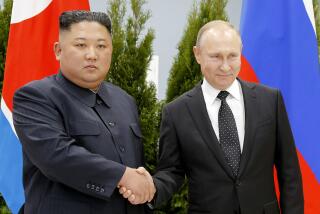Gorbachev Could Use Summit to Get Help for Soviet Reforms : Deals: German reunification, disarmament and regional conflicts are also expected to be discussed.
- Share via
MOSCOW — About 24 hours before the announcement of next Sunday’s U.S.-Soviet summit, a reporter asked Mikhail S. Gorbachev about his travel plans. “I will limit my trips abroad to the minimum in this period--to the possible minimum,” the Soviet president replied after two days of meetings on how to salvage the economy.
So on Saturday evening there was general surprise when state-run television broadcast a one-sentence bulletin saying Gorbachev will travel to Helsinki one week from today to discuss “international and bilateral issues” with President Bush.
Despite its unexpectedness, the latest event in U.S.-Soviet history--Gorbachev’s eighth meeting with an American President--will be greeted with a shrug by many here. Attention is already focused on other arenas, like the national and Russian republic’s legislatures, where as early as Monday, debate will open on how to halt the spiral of economic decline and institute market-style reforms.
With the shortage-riddled economy now so badly off that, as one newspaper bitterly noted, desperate smokers gladly buy jars of cigarette butts, Gorbachev certainly knows he can expect little public relations capital at home from a hastily scheduled one-day meeting with Bush.
However, with U.S.-Soviet ties closer than ever, Helsinki will be a timely occasion for the Kremlin leader to do some horse-trading to help bolster his own political position and seek more Western help for his reforms, which he admitted to reporters Friday were undergoing “serious trials.”
Since the presidents last met in June in Washington, D.C., Gorbachev’s list of domestic woes has gotten longer. The very term Soviet Union now seems outmoded, as republics one by one have declared their independence or sovereignty.
The radical populist who is the leader of Russia, Boris N. Yeltsin, has rapidly grown in stature to the point where, to millions disappointed by the meager fruits of Gorbachev’s perestroika, he seems a preferable, and very presidential, alternative.
When he meets Bush, Gorbachev could conceivably seek to capitalize on tit-for-tat deals or tangible benefits for the changed line of Soviet conduct. Among those areas:
* First and foremost, the Persian Gulf crisis, which has seen historic U.S.-Soviet cooperation and coordination to extinguish a Third World hot spot, but which Kremlin officials say will cost their country more than $800 million in lost trade with Iraq this year alone.
* The so-called two-plus-four negotiations on German reunification, whose next round in Moscow on Sept. 12 is supposed to be the last, but where some issues remain unresolved.
* Separate sets of disarmament negotiations in which superpower envoys are said to be marking time: the Conventional Forces in Europe (CFE) talks in Vienna and bilateral negotiations on cutting strategic nuclear weapons.
* Efforts to end conflicts in Afghanistan and Cambodia. On Cambodia, Washington and the Kremlin have agreed at the United Nations to what one U.S. official said will be an unprecedented U.N. peacekeeping operation that could cost $5 billion.
In one area, a deal seems certain.
At the Washington summit, Bush had agreed to grant Moscow the same tariff terms that the United States sets for its allies--most favored nation status--as soon as the Supreme Soviet legislature completes work on a law to allow citizens to emigrate freely.
A draft of that legislation, which had originally been expected in time for Gorbachev’s trip to Washington, is now ready for submission at the Supreme Soviet session that begins immediately after the Helsinki summit, and doubtless some member of Gorbachev’s entourage will be carrying a copy to show the Americans.
MFN status would allow Soviet products to enter the U.S. market at a lower tariff rate, making them more competitive and giving a boost to the Kremlin’s campaign to sell more abroad and thus earn more convertible currency.
Although Bush has told reporters that he had suggested the third meeting between himself and Gorbachev, the location--the Finnish capital about 600 miles northwest of Moscow--was obviously selected for Gorbachev’s convenience.
With three different political institutions about to begin meetings that could prove crucial--the Russian Parliament on Monday, the Russian Communist Party on Tuesday and the Soviet legislature on Sept. 10--Gorbachev will be able to meet with the Americans and get back home quickly for any necessary damage control.
Although Bush said Saturday that he didn’t foresee Moscow playing a mediating role in the Persian Gulf crisis, the different postures taken by the superpowers often seem like a diplomatic version of “good cop, bad cop.” For example, the United States sent aircraft carriers to the Persian Gulf, and Gorbachev sent a special envoy.
Asked at a Friday news conference if the superpowers differ on how to handle Iraq, Gorbachev answered: “We all have to be very responsible so that a large-scale military conflict is not unleashed. This, I think, is our mutual concern. . . . If you think that this is disagreement in our policies, I, on the contrary, think this is cooperation.”
By speaking in Helsinki with one voice to Iraqi President Saddam Hussein, Bush and Gorbachev would vividly demonstrate the new relationship between their countries, as well as dramatically serve notice to Baghdad of its isolation in the world community.
More to Read
Sign up for Essential California
The most important California stories and recommendations in your inbox every morning.
You may occasionally receive promotional content from the Los Angeles Times.










